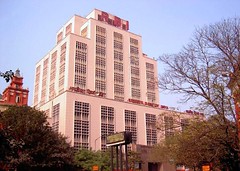 Some of India’s largest real estate firms such as DLF, Unitech, Omaxe and Parsvnath that launched multiple projects at the peak of the real estate boom are now under pressure from buyers and investors who look to exit these projects.
Some of India’s largest real estate firms such as DLF, Unitech, Omaxe and Parsvnath that launched multiple projects at the peak of the real estate boom are now under pressure from buyers and investors who look to exit these projects.
Already in a difficulty due to unavailability of bank loans and a fall in sales, the developers are less inclined to oblige the buyers who are coming together to mount pressure for refunds in projects that are yet to take off.
Several buyers and investors, angered by the developers’ inability to start work on projects, have stopped payment of installments on their purchases, adding to the companies’ cash problems.
Investors in DLF’s commercial projects in Delhi and Kolkata have come together with the help of brokers to put pressure on DLF to start construction or refund initial deposits.
The broker says DLF has not even paid the government to convert the industrial plots at Shivaji Marg and Okhla in Delhi into commercial plots. However, a DLF spokesman denied this saying, “We go by the agreement with the buyers signed at the time of booking. The allegations over the status of our projects are not true. We will deliver as per schedule.”
Several projects of Omaxe, Unitech and Parsvnath are also facing similar problems. Akash Verma, a Noida-based garment exporter, had booked an apartment each in projects of Omaxe and Unitech in Noida. He booked an apartment at the ‘soft launch’ of Omaxe’s Noida project in May 2007. Omaxe had promised to launch the project formally a few months later at a higher rate. The formal launch never happened and investors like Mr Verma are stuck. Omaxe has turned down requests for a refund. An Omaxe spokesman, however, said the company has ‘considered and taken care’ of all such requests.
Mr Verma has also been unsuccessfully seeking a refund of his investment in Unitech’s Grande project. “I am paying Rs 4.5 lakh as EMI. Unitech executives say the project will be delivered on schedule, but there is no worker at the site,” he says. A Unitech spokesman said, “We generally discourage cancellations. But if the buyers insist, we refund the money after deducting 10-15% of the total value of the apartment.”
Most realty firms do not encourage refund requests. Till the end of 2007, investors could easily sell their property in open market as the prices were going up. But with buyers disappearing from the market, investors are forced to approach developers for refunds.
Some property buyers are seeking refunds due to their weakened financial positions, while several others do so as they are not sure of the developers’ ability to complete the project. There are a few others who seek refunds as they feel that they can strike a better deal now with prices undergoing a major correction.






